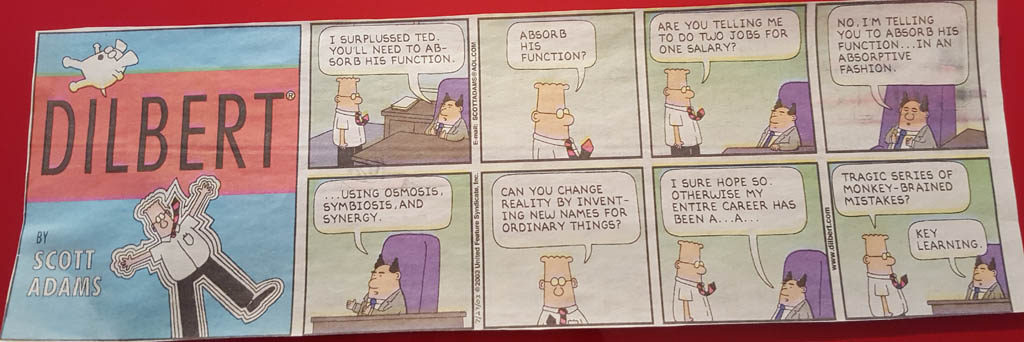My last four blogs have been all about words in a serious vein—writing well, praising English, cultivating reading—but now let’s turn to words in a lighter vein. Like all writers, I collect articles, cartoons, quotations that pique my interest, squirreling them away in neat piles—unlike most writers, I keep a very neat office—to use another day. These fit the bill to a T—enjoy!
Wordplay
The Washington Post’s 2002 Style Invitational asked readers to take any word in the dictionary, alter it by adding, subtracting or changing one letter and then supply a new definition. And the winners are:
- intaxication – Euphoria at getting a tax refund, which lasts until you realize it was your money to start with.
- bozone (n) – The substance surrounding stupid people that stops bright ideas from penetrating. The bozone layer, unfortunately, shows little sign of breaking down in the near future.
- giraffiti – Vandalism sprayed very, very high.
- sarchasm – The gulf between the author of sarcastic wit and the person who doesn’t get it.
- inoculatte – To take coffee intravenously when you are running late.
- hipatitis – Terminal coolness.
- osteopornosis – A degenerate disease.
- kalmageddon – It’s like, when everybody is sending off all these bad vibes, right? And then, like, the Earth explodes and it’s like, a serious bummer.
- decafalon (n) – The grueling event of getting through the day consuming only things that are good for you.
- glibido – All talk and no action.
- Dopeler effect – The tendency of stupid ideas to seem smarter when they come at you rapidly.
- ignoranus – A person who is both stupid and an asshole.
Versatility
Extolling the glories of English in Blog #14, I praised the language’s preference for short, strong words and then the versatility of some words to span a world of different meanings. Perhaps the one that embodies this trait to the nth degree is “UP”. It’s easy to understand UP, meaning toward the sky or the top of the list, but when we waken in the morning, why do we wake UP?
At a meeting, a topic comes UP. We speak UP, and officers are UP for election. It is UP to the secretary to write UP the minutes.
We call UP our friends. We brighten UP a room, polish UP the silver, warm UP leftovers and clean UP the kitchen. We lock UP the house, and hire a mechanic to fix UP an old car.
People stir UP trouble, line UP for tickets, work UP an appetite and think UP excuses. And to be dressed is one thing, but to be dressed UP is special.
Now it becomes confusing. A drain must be opened UP because it is stopped UP. A store is opened UP in the morning and closed UP at night. When it threatens to rain, we say it’s clouding UP; when the sun comes out, we say it’s clearing UP. When it rains, it wets UP the earth; when it doesn’t rain for awhile, things dry UP.
Look UP the word in the dictionary, and its definitions add UP to about 30. Try building UP a list of the many ways UP is used, and you may wind UP with 100 or more.
One could go on and on, but my time is UP so I’ll wrap it UP—and shut UP.
Trying to impress
And then, of course, there’s the ever-present bureaucratese/corporatese that throws roadblocks in the route to understanding in governments and corporations. Trying to impress, they muddy the meaning, sometimes to the point of extinction. Scott Adams in his alter-ego of Dilbert captures this perfectly: We laugh as we cringe in recognition of our language sins.
Trying to be elegant
With the shaky grasp of grammar across the millennial world, when to use ‘I’ and ‘me’ can be a menace to chill the heart of an aspiring professional. In a desperate stab at correct usage, they say, “Thank you for meeting with Jane and I” or “I introduced John and he”. But the pièce de resistance in the pursuit of elegance was uttered by a young twit who had brought a puppy to the open-concept office and when asked whose dog it was, answered brightly, “Oh, it’s Paul’s and I’s”.
Trying to keep up
The English language is adding new words every day and developing dialects—Chinglish (Chinese-English), Spanglish (Spanish-English), Japlish (Japanese-English), Hinglish (Hindi-English)—as it rapidly spreads around the globe. According to Professor David Crystal, the author of the Cambridge Encyclopedia of the English Language, close to two billion people—more than a quarter of the people in the world—speak English. “That English became the first truly global language in the 1990s is beyond dispute, but there is debate about where it goes from here. Does it splinter into a loosely connected family of English languages, which become mutually incomprehensible again, like old Latin, or do we develop a standard global English that can be understood by all?”
My money’s on the latter as we chatter to everyone everyday everywhere in our connected world. So keep on learning the language—its grammar, its punctuation, its spelling—to communicate well and elegantly around the globe.





Love your essay on “up”. We really do start taking these hard-working little words for granted, and yet, it is all completely logical and understandable.
Please keep an eye on the English hybrid dialects. As one professor said, English is an easy language to learn poorly.
I loved the definitions especially “bozone” as sometimes I feel I am surrounded by people with bonzones.